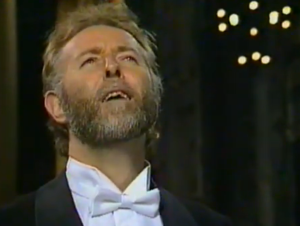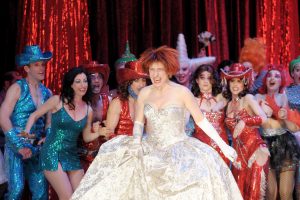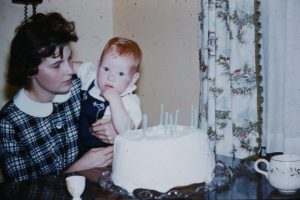Podcast: Play in new window | Download (Duration: 1:41:00 — 122.0MB) | Embed
Subscribe: Spotify | TuneIn | RSS | More
Last week on July 25th, the music world was saddened by the death of the Cornish baritone Benjamin Luxon at the age of 87. I began collecting recordings of this exceptional artist a few years ago with the intention of producing an episode in his honor at some point. Here is that episode, albeit a posthumous effort now. In an episode I produced in the first few months of Countermelody in 2019, I featured the French baritone Gérard Souzay and called him “a modern troubadour.” There are very few singers of recent years to whom one could accurately apply that appellation, but Ben Luxon is emphatically one of them. Music and words simply flowed out of him, and he sang with equal aplomb in an extraordinary number of different styles: opera, oratorio, art song, Broadway, crossover, and, perhaps most immediately and delectably, folk. In opera alone his range was exceptional, covering key roles in Mozart, Verdi, Tchaikovsky, Wagner, Berg, and Britten, who wrote the title role of his television opera Owen Wingrave expressly for Luxon. In song as well he covered a vast array of repertoires, including Russian, German, and British (including Victorian ballads), including, again, many contemporary composers. Luxon’s career hit a snag in the late 1980s, when he first began experiencing hearing loss which eventually resulted in him putting a stop to his singing career. But he hardly retired: moving to the Berkshires, he became actively involved in the artistic life of the region, and founded a theatre troupe, the Sandisfield Players, while continuing to give poetry readings and spoken word performances. The program today attempts to recreate his profound versatility, and range from folk song to pop song; from orchestral song cycles to world premiere creations; art songs by Hugo Wolf, Mussorgsky, George Butterworth, Schubert, and John Ireland; to late career narration and poetry projects. Collaborators include artists such as Benjamin Britten, Bill Crofut, Galina Vishnevskaya, Leonard Bernstein, Robert Tear, Janet Baker, Seiji Ozawa, Ileana Cotrubaș, Jill Gomez, Klaus Tennstedt, Mstislav Rostropovich, and his most frequent recital collaborator, pianist David Willison.
Countermelody is a podcast devoted to the glory and the power of the human voice raised in song. Singer and vocal aficionado Daniel Gundlach explores great singers of the past and present focusing in particular on those who are less well-remembered today than they should be. Daniel’s lifetime in music as a professional countertenor, pianist, vocal coach, voice teacher, and journalist yields an exciting array of anecdotes, impressions, and “inside stories.” At Countermelody’s core is the celebration of great singers of all stripes, their instruments, and the connection they make to the words they sing. By clicking on the following link (https://linktr.ee/CountermelodyPodcast) you can find the dedicated Countermelody website which contains additional content including artist photos and episode setlists. The link will also take you to Countermelody’s Patreon page, where you can pledge your monthly support at whatever level you can afford. Bonus episodes available exclusively to Patreon supporters are currently available and further bonus content including interviews and livestreams is planned for the upcoming season.



